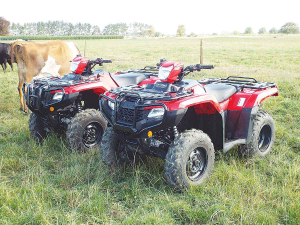Quad safety promoted as part of the product
It's hard to believe that quad bikes or ATVs have been around for about 50 years – even longer if you add in the balloon-tyred trikes that first appeared in the Bond movie Moonraker.
 New regulations in Australia around Crush Prevention Devices will see Honda quit selling ATVs in that market.
New regulations in Australia around Crush Prevention Devices will see Honda quit selling ATVs in that market.
Honda Australia has signalled it will stop selling quads/ATVs in that country as the discussion about the effectiveness of Crush Prevention Devices (CPD’s) rages on.
Honda’s move was brought about by changes to the minimum safety requirements enacted by the Australian Government in October 2019.
“The new standard is extremely disappointing for farm safety and the countless users who rely on a quad every day,” says director of Honda Australia, Robert Toscano.
Driven by the Australian Competition and Consumer Committee (ACCC), who require the compulsory fitment of CPD’s by October 2021, the initiative is centred on the use of aftermarket devices currently available, none of which appear to be built to any agreed common standards.
Toscano says the safety of its customers is paramount and Honda will never compromise on this.
“Safety standards must be evidence-based, in both criteria and testing methods, to internationally accepted standards,” he adds. “Honda has provided research to show the negative outcomes of the governments’ proposal, but unfortunately it was not considered, and we are here in this position today.”
Toscano says Honda will continue to advocate for safety measures the company believe are ‘proven’ such as mandating helmets, supporting ride training and preventing children under the age of 16 from riding adult sized quad bikes.
ACCC deputy chair Mike Keogh disputes a claim that it is too difficult for manufacturers to meet the required standards.
“We deliberately designed the standard around existing CPD’s. We didn’t specify an exact requirement, with the only proviso being that devices needed to meet or exceed the existing roll-over protection devices.”
This seems a little strange, as none of the devices currently available appear to be built to any recognised standard for design or manufacture.
Honda Australia claims that despite numerous recent coronial inquests, CPD’s have not specifically been recommended by coroners. However, Keogh says while this had not been ruled out, organisations more qualified in such matters should investigate what controls should be put in place.
Meanwhile, in New Zealand, Rural News understands there is likely to be a ministerial decision on the matter, prior to the upcoming election, with regulations in place by mid-2021.
It is understood the likely direction will recommend that the owner (PCBU -person conducting a business or undertaking) of the “mobile-plant” will have obligations to decide what type of crush prevention devices are suitable for their situation. This might be as simple as a safety helmet, which under the proposed regulations will be considered a CPD.
This will mean that a CPD will be able to range from a simple helmet to and aftermarket frame-type device fitted to a machine.
It is believed these proposals will be acceptable to NZ distributors of quads/ATVs.
However, they will continue to promote the need for initial and ongoing training, alongside legislation to prohibit under 16-year olds riding full size machines, and the compulsory use of good quality safety at all times.
Donald Trump's latest tariff tantrum has again thrown the world of trade into a new round of turmoil and uncertainty, and NZ is caught up in it.
The third edition of the NZ Dairy Expo, held in mid-February in Matamata, has shown that the KISS principle (keep it simple stupid) was getting a positive response from exhibitors and visitors alike.
Twenty years ago, South African dairy farm manager Louis Vandenberg was sent to a farm in Waikato to provide training on Afimilk technology.
Strong farmgate milk price is helping boost investment on farms, says PGG Wrightson chief executive Stephen Guerin.
Fonterra's 460 milk suppliers in Australia, who will switch to Lactalis end of this month, are unfazed with the impending change.
The 5+ A Day Charitable Trust has launched a collection of affordable recipes designed to turn everyday vegetables into seasonal stars.

OPINION: A mate of yours truly reckons rural Manawatu families are the latest to suffer under what he calls the…
OPINION: If old Winston Peters thinks building trade relations with new nations, such as India, isn't a necessary investment in…